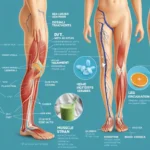Your heart is not just a pumping machine; it’s the heartbeat of your being. But as we age, the risk of heart disease becomes a looming concern. You can lower this risk and maintain your ticker for many years by making the appropriate lifestyle adjustments. How to reduce the risk of heart disease? Here are 10 actionable steps that could make all the difference in your heart health journey.
10 Tips to Reduce the Risk of Heart Disease
Here are 10 tips to reduce the risk of heart disease:
1. Eat a Heart-Healthy Diet

The food you eat is fuel for your heart. A heart-healthy diet can significantly lower your chances of getting heart disease. Focusing on nutrient-dense foods is the key:
- Emphasize fruits, veggies, and whole grains: These foods are Packed with vitamins, minerals, and fiber and can help lower cholesterol and keep your weight in check.
- Choose lean proteins: Opt for fish, poultry without skin, and beans to keep your heart strong without the extra saturated fat in red meats.
- Healthy fats: Omega-3 fatty acids, present in some nuts and fish, can lower the risk of heart arrhythmias, reduce triglycerides, and lower blood pressure.
- Cut out the bad stuff: Decrease your consumption of saturated and trans fats, cholesterol, salt, and added sweets. Keep an eye on portion sizes, too.
2. Get Regular Exercise

Physical activity is like a dose of magic for your heart. It strengthens your cardiovascular system and helps with weight management:
- Aim for regular sessions: At least 150 minutes of moderate-intensity aerobic exercise per week will benefit your heart.
- Include variety: Incorporate a mix of cardio, strength training, and flexibility exercises for balanced fitness.
- Make it a habit: Set a schedule, find activities you enjoy, and make it a routine. Even small bursts of exercise can add up to significant health benefits.
3. Maintain a Healthy Weight

Being overweight can strain your heart and raise your risk for conditions like diabetes and high blood pressure:
- Understand your BMI: Aim for a body mass index (BMI) within the normal range, typically 18.5 to 24.9.
- Healthy eating and exercise: These are the cornerstones of weight management. Making them sustainable habits is crucial to achieving and maintaining a healthy weight.
- Speak to a professional: A healthcare provider can help you set realistic goals and provide support on your weight loss or maintenance journey.
4. Quit Smoking

Tobacco is one of the deadliest enemies of heart health. If you smoke, start planning to quit now:
- Explore support options: There are many ways to quit, from smoking cessation programs to nicotine replacement therapies and prescription drugs. Alignment with a healthcare provider can increase your success rates.
- Lean on loved ones: Share your goal with family and friends. Having a support network is invaluable when you’re tackling a tough habit like smoking.
- Remember your ‘why’: Whether it’s for better health, to set a good example, or to save money, keep your reasons to quit at the front of your mind.
5. Limit Alcohol Consumption

While some studies tout the benefits of moderate alcohol consumption, excessive drinking can lead to heart problems.
- What is moderation?: For heart health, moderate drinking is defined as up to one drink per day for women and two drinks per day for men.
- Know your limits: Keep track of how much you’re drinking and be honest about your intake. If you’re using alcohol to cope with stress or other problems, consider talking to a healthcare provider.
- Be mindful of portion sizes: A standard drink is smaller than you think. Measure your pour to guarantee you’re doing it correctly.
6. Manage Stress

Chronic stress can send your heart into overdrive. One of the most effective strategies in your toolbox for preventing heart disease is learning to manage stress:
- Exercise your way to peace: Physical activity is a fantastic stress-buster. Find an activity you love and make it part of your routine.
- Mindfulness and meditation: These techniques can support you in maintaining your composure in the face of stress in life. Simple breathing exercises can also lower stress levels quickly.
- Know when to get professional help: If you’re overwhelmed by stress, a therapist or counselor can provide tools to help you cope.
7. Control Blood Pressure

Hypertension, or high blood pressure, is a significant risk factor for heart disease and a silent killer:
- Get it checked: Regular blood pressure screenings are essential, especially as you age.
- Healthy habits: Diet, exercise, and stress management can keep your blood pressure healthy.
- Medication, if necessary: Sometimes lifestyle changes aren’t enough. If your blood pressure remains high, medication can be a critical tool in reducing your risk of heart disease.
8. Manage Cholesterol Levels

Cholesterol is a waxy molecule found in the blood and cells. Excessive buildup on arterial walls increases the risk of heart disease, even though the body requires it. Here’s how to keep it in check:
- Mind your diet: A heart-healthy diet is one of the best cholesterol management methods.
- Stay active: Regular exercise can help raise ‘good’ HDL cholesterol and lower ‘bad’ LDL cholesterol.
- Consider medication: If lifestyle changes don’t sufficiently lower your cholesterol, your doctor may prescribe statins.
9. Control Diabetes

Diabetes dramatically boosts the risk of heart disease. Keeping it under control is vital for your heart health:
- Monitor your blood sugar: You can better understand how your body reacts to treatment with regular check-ups.
- Lifestyle changes: Diet, exercise, and weight management can help control your diabetes.
- Medication and insulin: Some people with diabetes require medication or insulin therapy. Work closely with your healthcare provider to find the best approach for you.
Also Read- Chewing Tobacco and Mouth Cancer
10. Get Regular Check-ups

Preventive care is critical in managing your heart health. Regular check-ups can uncover any issues early and ensure you’re on the right track with your preventive measures:
- Schedule your appointments: Stick to a calendar of regular check-ups, including blood work and diagnostic tests, as your healthcare provider recommends.
- Stay current with your health knowledge: Be aware of any heart disease risks in your family and discuss them with your healthcare provider.
- Listen to your body: Seek medical attention if something doesn’t feel right. The diagnosis of heart disease or another ailment may be made based on the examination results by your healthcare doctor.
Conclusion
The road to a healthy heart is paved with everyday choices. By taking the time to prioritize your cardiovascular health, you’re not just adding years to your life, but life to your years. These ten steps are straightforward, but they require commitment and regular practice. Minor modifications can help avoid heart disease and improve general health. Start implementing these suggestions today and begin your journey to a heart-healthy lifestyle. Your future self will thank you.
Hi there! I’m content writer and blogger. With over two years of experience, I’ve shared my passion for writing across various platforms. I firmly believe in the transformative power of words and look forward to sharing this journey with you. Enjoy my work!










